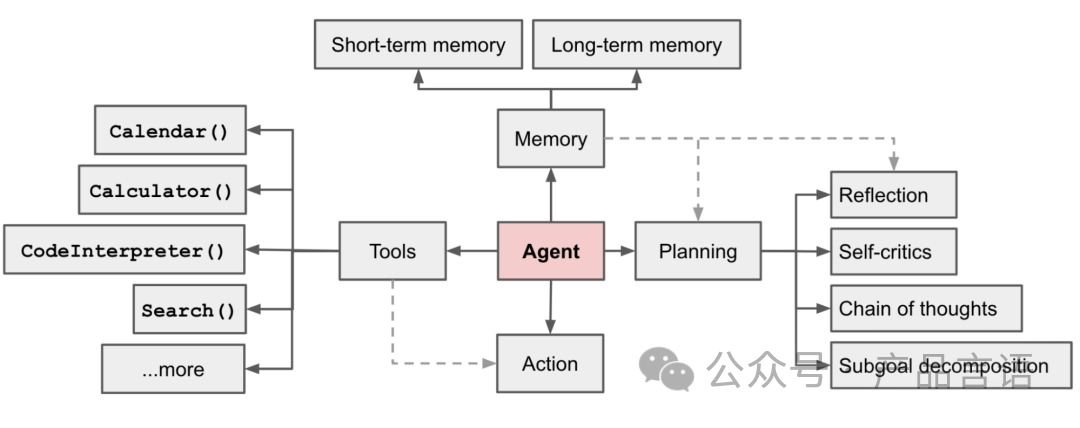ChatGPT has released GPTs, and DingTalk has launched AI assistants. In the AI era, AI agents are the mainstream form of implementing large models in business scenarios. So, what is an AI Agent?

01
—
What is an AI Agent?
An AI Agent, or Artificial Intelligence Agent, is an entity capable of perceiving its environment, understanding autonomously, making decisions, and executing actions. AI Agents possess the ability to achieve given goals through independent thinking and the use of tools. Unlike large models, which interact with humans through prompts, the effectiveness of which depends on their clarity, an AI Agent can think independently and accomplish tasks with just a single directive.
Large models are trained on vast datasets that include various types of data and a significant amount of human behavior data, enabling them to simulate human interactions. As these models grow, they exhibit capabilities similar to human thought processes, such as contextual learning, reasoning chains, and inference abilities. However, large models also face numerous issues, such as hallucinations and contextual limitations. Therefore, using large models as the core brain of an AI Agent allows for the decomposition of complex tasks into manageable subtasks, creating an intelligent entity capable of autonomous decision-making and task execution.
02
—
AI Agent System ArchitectureA large model-based AI Agent system can be divided into a collection of LLM (Large Language Model), Memory, Planning, and Tool usage. In an AI Agent system based on LLM, the large model serves as the brain of the AI Agent system, responsible for computation, and requires other components for support. 1. Planning① For complex tasks that require more steps, the AI Agent can invoke the LLM to decompose tasks using its reasoning chain capabilities. In the AI Agent architecture, task decomposition and planning are achieved based on the capabilities of the large model. The reasoning chain (Chain Of Thought, COT) ability of the large model allows for step-by-step thinking through prompts, breaking down large tasks into smaller, manageable sub-goals for efficient handling of complex tasks.② Through a reflection and introspection framework, AI Agents can continuously improve their task planning abilities. The AI Agent can self-critique and reflect on past actions, learning from mistakes and analyzing, summarizing, refining, and enhancing future actions to improve the quality of outcomes. This introspection framework enables the AI Agent to correct previous decisions, leading to continuous optimization. Such reflection and refinement can help Agents enhance their intelligence and adaptability.2. Memory① Short-term memory: All inputs to the AI Agent system become the system’s short-term memory, and all contextual learning relies on the model’s short-term memory capabilities. Short-term memory is limited by the finite context window length, which varies across different models.② Long-term memory: When the AI Agent completes a goal, the external vector database it queries becomes the system’s long-term memory. Long-term memory enables AI Agents to retain and access an unlimited amount of information over time. The external vector database can be accessed through rapid retrieval. The AI Agent primarily utilizes long-term memory to accomplish many complex tasks, such as reading PDFs and knowledge bases.③ The vector database stores data by converting it into vectors.3. Tools① The AI Agent can use external tool APIs to extend its capabilities and access information beyond the large model. This includes scheduling, setting tasks, querying data, etc.② Models like GPT have also updated their plugin functionalities, allowing them to call plugins to access the latest information or specific data sources. However, users must pre-select the plugins needed for their queries, which limits the ability to answer questions naturally. The AI Agent can automatically call tools based on the planning of each task step, determining whether external tools are needed to complete the task and providing the information returned by the tool API to the large model for the next task.The process of using the DingTalk AI assistant tool:
1. Planning① For complex tasks that require more steps, the AI Agent can invoke the LLM to decompose tasks using its reasoning chain capabilities. In the AI Agent architecture, task decomposition and planning are achieved based on the capabilities of the large model. The reasoning chain (Chain Of Thought, COT) ability of the large model allows for step-by-step thinking through prompts, breaking down large tasks into smaller, manageable sub-goals for efficient handling of complex tasks.② Through a reflection and introspection framework, AI Agents can continuously improve their task planning abilities. The AI Agent can self-critique and reflect on past actions, learning from mistakes and analyzing, summarizing, refining, and enhancing future actions to improve the quality of outcomes. This introspection framework enables the AI Agent to correct previous decisions, leading to continuous optimization. Such reflection and refinement can help Agents enhance their intelligence and adaptability.2. Memory① Short-term memory: All inputs to the AI Agent system become the system’s short-term memory, and all contextual learning relies on the model’s short-term memory capabilities. Short-term memory is limited by the finite context window length, which varies across different models.② Long-term memory: When the AI Agent completes a goal, the external vector database it queries becomes the system’s long-term memory. Long-term memory enables AI Agents to retain and access an unlimited amount of information over time. The external vector database can be accessed through rapid retrieval. The AI Agent primarily utilizes long-term memory to accomplish many complex tasks, such as reading PDFs and knowledge bases.③ The vector database stores data by converting it into vectors.3. Tools① The AI Agent can use external tool APIs to extend its capabilities and access information beyond the large model. This includes scheduling, setting tasks, querying data, etc.② Models like GPT have also updated their plugin functionalities, allowing them to call plugins to access the latest information or specific data sources. However, users must pre-select the plugins needed for their queries, which limits the ability to answer questions naturally. The AI Agent can automatically call tools based on the planning of each task step, determining whether external tools are needed to complete the task and providing the information returned by the tool API to the large model for the next task.The process of using the DingTalk AI assistant tool: